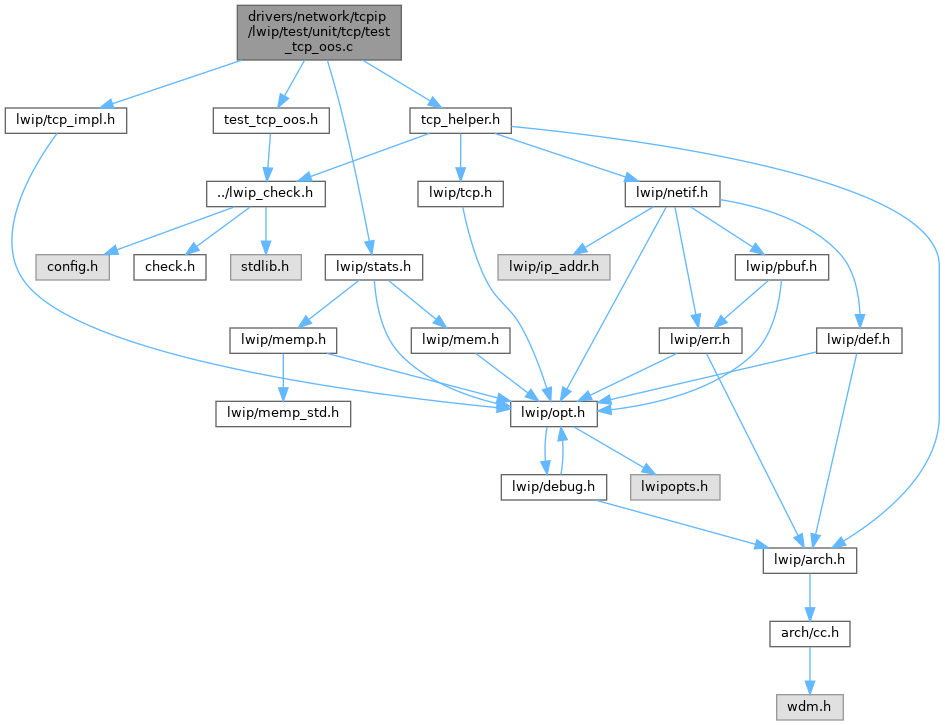#include "test_tcp_oos.h"#include "lwip/priv/tcp_priv.h"#include "lwip/stats.h"#include "tcp_helper.h"
Go to the source code of this file.
Macros | |
| #define | CHECK_SEGMENTS_ON_OOSEQ 1 |
| #define | EXPECT_OOSEQ(x) EXPECT(x) |
| #define | FIN_TEST(name, num) |
Functions | |
| static int | tcp_oos_count (struct tcp_pcb *pcb) |
| static u32_t | tcp_oos_seg_seqno (struct tcp_pcb *pcb, int seg_index) |
| static int | tcp_oos_seg_tcplen (struct tcp_pcb *pcb, int seg_index) |
| static int | tcp_oos_tcplen (struct tcp_pcb *pcb) |
| static void | tcp_oos_setup (void) |
| static void | tcp_oos_teardown (void) |
| START_TEST (test_tcp_recv_ooseq_FIN_OOSEQ) | |
| END_TEST | START_TEST (test_tcp_recv_ooseq_FIN_INSEQ) |
| START_TEST (test_tcp_recv_ooseq_overrun_rxwin) | |
| END_TEST | START_TEST (test_tcp_recv_ooseq_overrun_rxwin_edge) |
| END_TEST | START_TEST (test_tcp_recv_ooseq_max_bytes) |
| END_TEST | START_TEST (test_tcp_recv_ooseq_max_pbufs) |
| static END_TEST void | check_rx_counters (struct tcp_pcb *pcb, struct test_tcp_counters *counters, u32_t exp_close_calls, u32_t exp_rx_calls, u32_t exp_rx_bytes, u32_t exp_err_calls, int exp_oos_count, int exp_oos_len) |
| static void | test_tcp_recv_ooseq_double_FINs (int delay_packet) |
| Suite * | tcp_oos_suite (void) |
Variables | |
| static struct netif * | old_netif_list |
| static struct netif * | old_netif_default |
| static END_TEST char | data_full_wnd [TCP_WND+TCP_MSS] |
Macro Definition Documentation
◆ CHECK_SEGMENTS_ON_OOSEQ
| #define CHECK_SEGMENTS_ON_OOSEQ 1 |
CHECK_SEGMENTS_ON_OOSEQ: 1: check count, seqno and len of segments on pcb->ooseq (strict) 0: only check that bytes are received in correct order (less strict)
Definition at line 17 of file test_tcp_oos.c.
◆ EXPECT_OOSEQ
◆ FIN_TEST
create multiple segments and pass them to tcp_input with the first segment missing to simulate overruning the rxwin with ooseq queueing enabled
Definition at line 964 of file test_tcp_oos.c.
Function Documentation
◆ check_rx_counters()
|
static |
Definition at line 784 of file test_tcp_oos.c.
Referenced by test_tcp_recv_ooseq_double_FINs().
◆ START_TEST() [1/6]
| END_TEST START_TEST | ( | test_tcp_recv_ooseq_FIN_INSEQ | ) |
create multiple segments and pass them to tcp_input in a wrong order to see if ooseq-caching works correctly FIN is received IN-SEQUENCE at the end
Definition at line 290 of file test_tcp_oos.c.
◆ START_TEST() [2/6]
| START_TEST | ( | test_tcp_recv_ooseq_FIN_OOSEQ | ) |
create multiple segments and pass them to tcp_input in a wrong order to see if ooseq-caching works correctly FIN is received in out-of-sequence segments only
Definition at line 154 of file test_tcp_oos.c.
◆ START_TEST() [3/6]
| END_TEST START_TEST | ( | test_tcp_recv_ooseq_max_bytes | ) |
Definition at line 633 of file test_tcp_oos.c.
◆ START_TEST() [4/6]
| END_TEST START_TEST | ( | test_tcp_recv_ooseq_max_pbufs | ) |
Definition at line 708 of file test_tcp_oos.c.
◆ START_TEST() [5/6]
| START_TEST | ( | test_tcp_recv_ooseq_overrun_rxwin | ) |
create multiple segments and pass them to tcp_input with the first segment missing to simulate overruning the rxwin with ooseq queueing enabled
Definition at line 460 of file test_tcp_oos.c.
◆ START_TEST() [6/6]
| END_TEST START_TEST | ( | test_tcp_recv_ooseq_overrun_rxwin_edge | ) |
similar to above test, except seqno starts near the max rxwin
Definition at line 547 of file test_tcp_oos.c.
◆ tcp_oos_count()
Get the numbers of segments on the ooseq list
Definition at line 28 of file test_tcp_oos.c.
Referenced by check_rx_counters(), and START_TEST().
◆ tcp_oos_seg_seqno()
Get the seqno of a segment (by index) on the ooseq list
- Parameters
-
pcb the pcb to check for ooseq segments seg_index index of the segment on the ooseq list
- Returns
- seqno of the segment
Definition at line 60 of file test_tcp_oos.c.
Referenced by START_TEST().
◆ tcp_oos_seg_tcplen()
Get the tcplen (datalen + SYN/FIN) of a segment (by index) on the ooseq list
- Parameters
-
pcb the pcb to check for ooseq segments seg_index index of the segment on the ooseq list
- Returns
- tcplen of the segment
Definition at line 84 of file test_tcp_oos.c.
Referenced by START_TEST().
◆ tcp_oos_setup()
Definition at line 125 of file test_tcp_oos.c.
Referenced by tcp_oos_suite().
◆ tcp_oos_suite()
| Suite * tcp_oos_suite | ( | void | ) |
Create the suite including all tests for this module
Definition at line 991 of file test_tcp_oos.c.
Referenced by main().
◆ tcp_oos_tcplen()
Get the tcplen (datalen + SYN/FIN) of all segments on the ooseq list
- Parameters
-
pcb the pcb to check for ooseq segments
- Returns
- tcplen of all segment
Definition at line 107 of file test_tcp_oos.c.
Referenced by check_rx_counters(), and START_TEST().
◆ tcp_oos_teardown()
Definition at line 136 of file test_tcp_oos.c.
Referenced by tcp_oos_suite().
◆ test_tcp_recv_ooseq_double_FINs()
Definition at line 806 of file test_tcp_oos.c.
Variable Documentation
◆ data_full_wnd
Definition at line 456 of file test_tcp_oos.c.
Referenced by START_TEST(), and test_tcp_recv_ooseq_double_FINs().
◆ old_netif_default
Definition at line 122 of file test_tcp_oos.c.
Referenced by tcp_oos_setup(), and tcp_oos_teardown().
◆ old_netif_list
Definition at line 121 of file test_tcp_oos.c.
Referenced by tcp_oos_setup(), and tcp_oos_teardown().